All truckers are familiar with Hours of Service regulations. If you’re caught falsifying a log book entry, what happens?
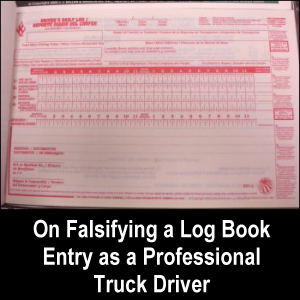 If a DOT officer examines your logbook and finds an error, can the consequences be serious or expensive?
If a DOT officer examines your logbook and finds an error, can the consequences be serious or expensive?
We will explore this subject with a focus on drivers in the USA…
Log Books
This is a log sheet from a log book available in a truck stop.
As we’re sure you know, there are four lines on a log book:
- Off Duty
- Sleeper Berth
- Driving
- On Duty (Not Driving)
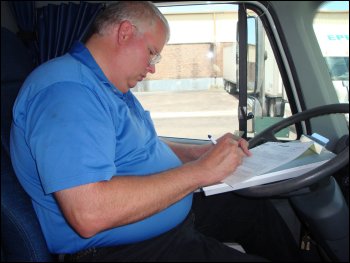 Here, Mike Simons is pictured filling out a loose-leaf log sheet.
Here, Mike Simons is pictured filling out a loose-leaf log sheet.
When he drove for this trucking company, he would separate the sheets in the log book before using them.
Many drivers prefer to use loose-leaf log sheets instead of a bound logbook because they are easier to handle.
Unfortunately, it can be easier to “fudge” or “be creative” — or engage in falsifying the record — when using loose leaf logbook sheets since they can easily be replaced.
You should always follow your company’s policies regarding log book binding.
(Note: paper log books will become a thing of the past if electronic log books become the law of the land. More on this below…)
Rules and Regulations
The Federal Motor Carrier Safety Administration (FMCSA) oversees their Rules and Regulations.
The part of the regulations covering a driver’s record of duty status is § 395.8.
No matter how log sheets are kept — bound or unbound — the record of a driver’s duty status must be truthful (that is, no falsifying the way you actually spent your time).
Why is that?
Take a look at paragraph (f)(7):
(7) Signature/certification. The driver shall certify to the correctness of all entries by signing the form containing the driver’s duty status record with his/her legal name or name of record. The driver’s signature certifies that all entries required by this section made by the driver are true and correct.
How serious is it to give an accurate assessment of one’s duty status in a log book?
Watch the short video (less than 2 minutes) below, courtesy of MichiganAutoLaw.com.
Furthermore, take a look at paragraph (e) from the same section of the regulation:
(e) Failure to complete the record of duty activities of this section or § 395.15, failure to preserve a record of such duty activities, or making of false reports in connection with such duty activities shall make the driver and/or the carrier liable to prosecution.
Laughing Matter?
 The issue about having to fill out logbooks is one that has been bandied about for years.
The issue about having to fill out logbooks is one that has been bandied about for years.
It is not uncommon to hear them referred to as “joke books” or “comic books.”
We once heard someone make light of keeping (or falsifying) a log book by chanting a pithy rhyme:
“Show the company what they want to see
and don’t get caught by the DOT.”
But obviously, this is no laughing matter.
Caught in the Middle
We know that some drivers are delayed at shippers’ and receivers’ facilities.
Drivers don’t want to be “docked” (no pun intended) for those delays, so they may try to work around the regulations.
As much as drivers don’t like the Hours of Service (HOS) regulations, they are really there for drivers’ protection against running fatigued.
A Charleston, South Carolina, law firm explains all sides concisely:
Aside from the danger of actually falling asleep at the wheel, studies show that truck drivers who exceed these limits are measurably less alert and react slower to crisis situations. Some drivers break the rules because they are paid per mile – the more they drive the more they are paid. Other times, drivers are pressured by the trucking company to speed and/or exceed Hours of Service to meet delivery deadlines.
Technology and Verification
It may become downright impossible for drivers to cheat (that’s a strong word, we know) or falsify their record of duty status if instead of using a paper log book, they are required to keep their hours on an electronic on-board recorder (aka “EOBR”) or an electronic logging device (aka “ELD”).
We have heard, though, that even electronic logs can be altered internally.
Another good reason to keep things legal and truthful is that verification can take place with all of the technological advances in our day like
- GPS tracking,
- QualComm satellite communication devices,
- cell phone records, etc.
Trucking companies most likely know where you are anyway.
Don’t say you’re doing something you’re not or that you are somewhere you’re not.
It could bounce back on you.
They Did What…?
Let’s take a brief look at drivers who were caught falsifying their log books.
- The Office of the Inspector General at the Department of Transportation formerly listed this:
Stanley N. Waddy Jr., a former commercial trucker for Tapscott Trucking in Thornburg, VA, was sentenced in U.S. District Court in Philadelphia to time served in prison on state charges (16 months) and put on five years of probation. Waddy pleaded guilty on January 5 to ten counts of making false statements to DOT for falsifying his driver logbook to hide how long he had been driving without rest. … (1)
- Here are the results of Google News searches on “falsifying logbook” and “falsifying log book“.
- A July 28, 2011, article formerly stated on TheOlympian.com:
An Oregon truck driver faces multiple charges after he fell asleep at the wheel on Interstate 5 near Tumwater early Thursday morning and his tractor-trailer crossed the concrete median barrier, blocking southbound traffic for five-and-a-half hours, police say.”(2)
Although no one was injured, there was an expensive cleanup and one of the charges the driver faces is falsifying his log book.
- As reported on May 7, 2012, a truck driver was sentenced to “18 months in a federal lockup” after pleading guilty to “federal charges he had falsified his driver’s logs” when he was involved in a 2009 accident that killed a businessman and seriously injured the car’s passenger. (3)
“Forced” to Falsify Logs?
 A driver may try to claim that he or she was “forced” by his or her company to operate beyond the scope of the federal law.
A driver may try to claim that he or she was “forced” by his or her company to operate beyond the scope of the federal law.
However, remember whose name is on every log sheet.
Is it your name or your boss’s name?
Yep, if you’re driving, it’s your name.
Refuse loads that you know you can’t legally pick up or deliver on time.
If you’re fired, it’s better to have your integrity intact than to risk being fined, jailed, put on probation or put completely out of the trucking industry.
Not only that, but you can report the company under the whistle blowing laws.
We have written before about refusing to take an illegal load and how we were punished for it.
However, we were vindicated in the end.
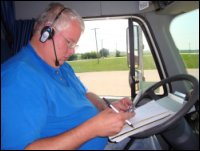 If you get fired by a company for refusing to violate your Hours of Service and for refusing to falsify your log book, then as uncomfortable as that may be, at least your conscience will be clear that you did the right thing and you may also have legal grounds for taking action (see the section under “Driver Protection” below).
If you get fired by a company for refusing to violate your Hours of Service and for refusing to falsify your log book, then as uncomfortable as that may be, at least your conscience will be clear that you did the right thing and you may also have legal grounds for taking action (see the section under “Driver Protection” below).
Put the burden of scheduling loads that can clearly be picked up and delivered on time back on your company’s shoulders.
That’s what customer service departments are for.
If you get delayed somewhere for any legitimate reason, make sure you communicate with your company what is going on.
There are numerous reasons for being delayed (weather, construction, accidents, shipper and receiver problems, etc.).
Don’t be afraid to use your QualComm to send a note or your cell phone to make a call.
We think that creating an electronic “paper trail” (to cover yourself) is important.
Pressure After the Fact
Mike once had a situation after he left the employment of a major trucking company in which they requested that he submit log sheets for two days after his last day of work for them.
He responded in writing
- that he had left on a certain day,
- that the logs they requested were beyond that point and
- that to submit logs for those dates would be a falsification.
We thought the matter was taken care of.
They wrote back again with the same request.
This time, we sent them a letter not only refusing their request — and telling them the reason why — but also informing them that if they persisted, we would turn the matter over to our law firm.
We received no more requests from them.
Pressure, pressure, pressure
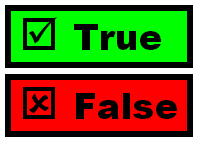 If you’re being pressured by your company to violate your Hours of Service and falsify your log book, then speak up in an appropriate way about the issues you’re having.
If you’re being pressured by your company to violate your Hours of Service and falsify your log book, then speak up in an appropriate way about the issues you’re having.
If your driver manager or fleet manager says something like, “Other drivers don’t have problems doing it,” you can reply, “I’m not other drivers.”
Remind him or her that you don’t have to resort to cheating or falsifying your log book in order to make a decent living as a truck driver.
And if you can’t make a decent living at that company without violating your HOS, then it’s time to move on.
Driver Protection
Here’s an interesting find: U.S. DOL ALJ Reinstates Truck Driver who Refused to Violate DOT Regulations, Awards $46k in Damages (4):
On May 24, 2010, Mr. Joe Oglesby, a former United States Marine, filed a complaint with the U.S. Department of Labor (DOL), alleging that his former employer, Foresight Transportation Group (Foresight), pressured truck drivers to work more hours than safely allowed and then to falsify their log books to avoid suspicion. Overturning the findings of a U.S. DOL investigation, Administrative Law Judge (ALJ) Richard Morgan held that Oglesby’s refusal to work more hours than permitted or to falsify records was a “protected activity” under the whistleblower provisions of the Surface Transportation Assistance Act of 1982 (STAA) and Oglesby’s protected activity was the reason Foresight fired him. The ALJ ordered Oglesby to be immediately reinstated and awarded him $26k in damages, including another $20k in punitive damages. …
Speaking of protections for drivers under the Surface Transportation Assistance Act, you may also wish to review another article on a slightly different topic.(4b)
Sue Their Socks Off!
One of the most horrendous situations imaginable for a professional truck driver is being involved in an accident with another large truck, a pedestrian or a private passenger vehicle.
It is an unfortunate mindset that when a large truck is involved in an accident, people automatically jump to the conclusion that the trucker was at fault.
Statistics show otherwise.(4c)
However, there are cases in which the truck driver truly is at fault.
One of the first things that law enforcement officers do after there is a truck accident is to find in the truck’s cab the driver’s log book to look for potential violations.
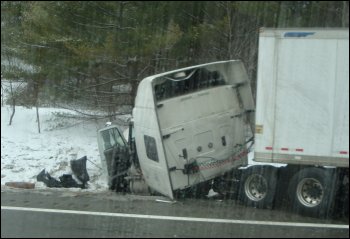 Assume for brief moment that you are the driver of the truck involved in such an accident.
Assume for brief moment that you are the driver of the truck involved in such an accident.
What are you going to do if your log book hasn’t been kept up-to-date?
We are aware that some drivers feel that they get “so busy” that they don’t “have time” to update their log books.
They let them go for 2 or 3 days at a time. (Try to remember all the details from that far back — good luck!)
We don’t think it happens much any more (although we could be wrong), but what about a driver who works 2 or 3 different log books at a time?
What happens if law enforcement encounters this kind of situation at an accident scene?
Mike has told Vicki that if he is ever involved in an accident with a tractor trailer in which he is injured or killed — and the other truck driver is clearly at fault — that the cab is to be thoroughly “torn apart” (searched) to find the log book(s) to determine the driver’s HOS compliance.
If the driver is out of compliance, she needs to “sue their socks off” (legally sue the driver and his/her company for as much money as possible).
If we — as a couple who has been involved in the trucking industry for a long time — feel this way about another trucker, how do you think other motorists completely outside the industry feel?
If this does not serve as a warning or wake-up call to you, then we believe you need to do one of three things:
- re-examine your priorities,
- bring yourself into compliance with the HOS regulations (no matter how much you despise them), or
- leave the industry altogether.
By the way, Wikipedia provides this definition:
“An accident is a specific, unpredictable, unusual and unintended external action which occurs in a particular time and place, with no apparent and deliberate cause but with marked effects.”
You can not predict when accidents will happen. That’s why they call them accidents.
Therefore, it behooves you to keep your log book up-to-date with the most recent change in driver status.
Don’t be caught unaware.
If you need help learning how to fill out a log book correctly, the FMCSA has Hours-of-Service Logbook Examples on their site.
Given those examples, no one can excuse falsifying a log book entry.
While We’re Addressing Honesty…
Let’s also be clear about one other matter: never falsify your employment application with a trucking company either.
You will most likely be caught when they do a background check. Honesty is the best policy.
Update
According to an October 25, 2013 article, one of three truckers whom the FMCSA took off the road “‘repeatedly and excessively’ falsified his on-duty records before the crash and exceeded federal limits on operator hours”.(5)
![]() Money saving tip: To keep things honest and above board at all times, “log as you go.”
Money saving tip: To keep things honest and above board at all times, “log as you go.”
Keep up with when your clock starts each day and calculate when you have to stop.
Give yourself (if possible) multiple options for stopping before you have to.
Yes, there can be problems with finding safe truck parking in some areas.
But plan ahead as much as you can, even if you have to pay to park legally somewhere.
Hint: Even if you are a newbie to the trucking industry and you are instructed by your driver trainer to run illegally (as this forum thread discusses), you are still responsible to do things correctly.
Consider the occupation-threatening nature of being caught falsifying your logs with less than a year’s experience.
Once you’re charged with violating this federal law, you may never be able to driver professionally again.
All the money you put into truck driver training school will have been wasted.
Protect your investment, your CDL and your career.
Return from On Falsifying a Log Book Entry as a Professional Truck Driver to our Truck Operations page or our Truck Drivers Money Saving Tips home page.
References
1. www.oig.dot.gov/library-item/3212 (no longer online)
2. www.theolympian.com/2011/07/28/1740732/semi-rollover-blocking-all-southbound/ (no longer online)
3. articles.philly.com/2012-05-08/news/31611366_1_fatal-schuylkill-crash-truck-driver-federal-charges (no longer online)
4. employmentlawgroupblog.com/2011/06/29/u-s-dol-alj-reinstates-truck-driver-who-refused-to-violate-dot-regulations-awards-46k-in-damages/ (no longer online)
4b. www.landlinemag.com/Story.aspx?StoryID=18946#.VD1Mq2ddXE4 (no longer online)
4c. www.landlinemag.com/Story.aspx?StoryID=14005#.VD1O7WddXE4 (no longer online)
5. www.ttnews.com/articles/basetemplate.aspx?storyid=33317&t=FMCSA-Takes-Three-Drivers-Off-the-Road (no longer online)







